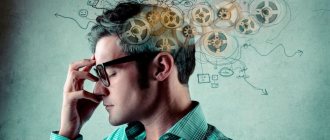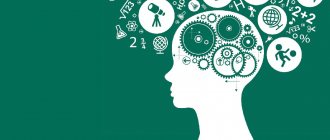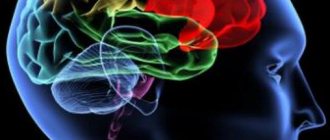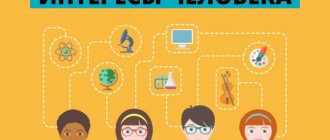Human mental abilities. Find which ones you have
Support us on social networks!
Every person has mental abilities, but due to certain circumstances, not everyone manifests them throughout their lives. The most common ability to perceive information from the Subtle World is premonition, or intuition. Often intuitive clues are drowned out by restless mental activity, so people either do not notice or do not listen to them.
In Russian, intuition can be called inner instinct. But besides instinct, a person potentially has a whole range of diverse capabilities that go beyond the scope of visible and tangible reality. Everyone has abilities, but not everyone knows which of them a person has. You just need to take control of them
Let us consider these natural abilities in detail.
Group "Perception"
1. Clairvoyance – the ability to perceive visual (figurative) information using the functions of the Third Eye. The third eye, or sixth chakra, is the visual center of the brain, responsible for perceiving rays of Light from parallel dimensions that are not physically visible. Rays of a subtle nature always carry information that the Third Eye can decode, transforming spatial vibrations into images. Most often, people see events of the past and present, less often options for the future. Clairvoyance has several varieties (for a person on Earth there are 7 types). Seven is the number of basic plans of the universe that exist in parallel in the Universe.
2. Clairaudience, or etheric hearing - the ability to hear sounds of parallel dimensions and communicate with beings of invisible worlds. Clairaudience differs from similar telepathy in that a person can hear absolutely any sounds from the Subtle Reality, and not just voices and someone’s thoughts. Many brilliant composers possessed the ability of ethereal hearing. Thanks to this, they translated cosmic sounds into earthly music. This is how famous musical masterpieces were born. The fifth chakra, Vishuddha, is responsible for the ability of clairaudience.
3. Ethereal sense of smell – the ability to perceive the aromas of the Subtle World. For example, a person can smell flowers on the street in the middle of a bitter winter, or receive information about the internal state of the interlocutor by distinguishing the smell of emotions. Love exudes the scent of roses, joy smells like citrus fruits, peace smells like pine, fear smells like mold, aggression smells like hot metal, etc. Chakra Vishuddha.
4. Psychometry is one of the types of Intuition. This is the ability to instantly read information from any object by touch. Refers to the fourth chakra, Anahata.
5. Ethereal touch is tactile sensitivity to energy fields. In most cases, the most sensitive organs are the arms - from the palms to the elbows, and the back along the spine. Refers to the first chakra, Muladhara, as it is a basic sensitivity that is present even in mineral life forms.
6. Telepathy - the ability to read or hear the thoughts of other beings at a distance. Telepathy can manifest itself in the perception of voice and speech, or it can be in the form of an instantaneous psychometric signal. Refers to the seventh chakra.
7. Predicting the future - this ability is not inherent in the average person. It is given as a gift from the Higher Powers as a reward for serving the Good of civilization over long centuries of incarnations. Or this ability is brought with them by souls of extraterrestrial origin who came to Earth from more developed worlds. Also refers to the seventh chakra.
8. Sense-knowledge, or Intuition - the ability to instantly perceive spatial information at the level of feelings, not through the mind, but through the Heart. Always points to the Right Path and direction where the Truth is. Information is perceived without images at the “I just know” level. The most reliable source of generalized information about any event and phenomenon.
Group “Flights of Subtle Bodies”
9. Mental travel - the ability to highlight your Mental body in meditation and under other conditions by mentally concentrating on the destination. For example, fly to a distant star or to the ends of the Earth, or to your loved one on a business trip, etc. Receiving information during the “flight” is carried out remotely via the Silver Thread, which connects the Mental Body (more precisely, one of several Mental bodies present in a person) and the waking consciousness.
10. Astral travel - isolating the Astral body in deep meditation or in sleep and traveling in the Subtle Worlds in FULL CONSCIOUSNESS. Communication with the physical body is also carried out through the Silver Thread, which connects all human bodies to each other. To fly to the Higher Worlds, you need to isolate the Astral body through the Third Eye or the Crown Chakra. This is naturally achieved through moral purification and spiritual growth. If the Astral is released through the three lower chakras or through the legs, the human soul goes into the lower worlds.
11. Lucid dreaming is the ability to maintain clear consciousness during sleep, and both the Astral and Mental and even the higher Spiritual bodies of a person can be involved here. Upon awakening, a person retains the MEMORY of all his alternating dreams and changing states of consciousness. In a dream, you can meditate, put your Astral body to sleep and travel in the Mental Shell into deep Space, or communicate with the Higher Self, the Spiritual Teacher, study at Space Academies, etc. And bring all the experience gained in a dream to Earth, into the reality of material existence. This is what the author of these lines does successfully.
12. Mediumship – the ability to partially release one’s Subtle shells and TEMPORARILY give up space in one’s body to another entity from the Subtle World in order to convey information or allow a certain action to be performed. VERY DANGEROUS and fraught with mental disorders, OBSESSION, as well as loss of the medium’s vitality. In ancient times, mediums were very strong and were conductors of the Higher Powers; now, more and more often, they encounter the dregs of astral society.
The abilities of the two groups described above are tools for understanding the world, given to man by Mother Nature and the Divine Ancestors. If a person begins to use these talents to the detriment of others or has a selfish goal, over time he loses them and becomes internally empty. Therefore, gifted people have a great responsibility to multiply the Light on Earth many times over and never succumb to Darkness.
Group "Matter and Energy Management"
13. Telekinesis - the ability to move objects at a distance through the power of thought. Here the crudest aspect of a person’s mental power is used - his will, concentrating the waves of the spatial ether, which cause the remote movement of an object. This also includes the ability of bodily magnetism.
14. Levitation - overcoming the force of gravity with the help of developed force biofields. Levitation itself is not evidence of Enlightenment or Spirituality, since it is caused by the influence of crude electromagnetic force generated by a trained person.
15. Teleportation - the ability to instantly move from one point to another without the help of vehicles. Can be done in different ways. Requires enormous amounts of energy to transform matter.
16. Materialization/dematerialization of objects - speaks for itself. It also requires huge energy costs.
Possession of one or more abilities from this category is not an indicator of high Spirituality and Morality, since this can be learned through certain practices that do not require a high moral level of the student. A person can receive one of these abilities by inheritance (active genes of the family), or develop it during life, having a good mentor. However, a person who has passed all the stages of initiation and reached the highest level of evolution on Earth often acquires these gifts along the way, as by-products of many years of service to the Good of humanity.
17. SPIRITUAL UNDERSTANDING is participation in the Highest Knowledge through generalization and synthesis of all Psychic abilities. The result is the achievement of the Absolute level of consciousness. The gift of Spiritual Understanding is given from Above in the form of Initiation and must be earned.
Where to start treatment
If you suspect the development of a mental disorder, the help of a psychiatrist is required. At the appointment, after a thorough examination, the doctor chooses how the patient will receive treatment:
- outpatient;
- in hospital;
- dispensary registration.
According to Article 29 of the Criminal Code of the Russian Federation, a patient can be hospitalized without the consent of him and his relatives in a hospital if his condition causes:
- harming oneself and others;
- inability to perform basic self-service actions;
- deterioration of the condition if the patient is not hospitalized.
Previously, treatment of the mentally ill was not distinguished by humanism and delicacy. For example, in 1936, the Portuguese doctor Egas Moniz proposed a method of lobotomy. That is, the removal of some parts of the brain. After 20 operations performed, he announced the results. seven experimental subjects were completely cured of mental illness, another seven showed noticeable improvements. For the rest, the condition remained at the same level.
Surprisingly, this method has gained great popularity, and its author was even awarded the Nobel Prize in Medicine.
Currently, therapy for the mentally ill is carried out in several directions and has a more gentle approach:
- pharmacotherapy;
- psychotherapy;
- social rehabilitation.
Abilities and aptitudes
A person’s abilities develop in accordance with his inclinations, which represent a manifestation of interest in a particular activity. The emerging inclinations encourage a person to develop the abilities corresponding to them. As a rule, tendencies begin to appear in early childhood.
There are individual and general inclinations. Individual inclinations, for example, include a child’s desire to study music, painting or technical sciences.
Common inclinations that arise in almost all children, for example, include a tendency towards manual labor. The development of this type of work is very important at a child’s early age, as it contributes to his mental development, forms and strengthens his ability to work, and also develops creative thinking.
It is very important to distinguish true inclinations from the desire for any activity for profit or as a result of its imposition on a person by other people. If the inclinations do not cause genuine love for the work, but are dictated only by the goal of success, the development of abilities in this case may be too difficult or impossible.
Conversely, true interest and love for a chosen activity or profession will lead to the full development of abilities corresponding to this activity.
Levels of ability development
Abilities are, in psychology, personality traits that affect a person’s ability to master the necessary skills and abilities in a certain field of activity.
Ability development consists of the following 3 levels:
- Determination and development of inclinations.
- Determination and development of inclinations.
- Development of abilities.
As a result of research into the development of human abilities, it has become clear that different abilities appear at different age periods during early childhood. For example, at the age of 2-4 years a child develops the ability to learn speech. At 5-6 years old the ability to read appears. At primary and secondary school age, the child exhibits aptitude for creative development.
If the child is not helped in developing the appropriate basic abilities at the right times, this may negatively affect his further development. These moments in ontogenetic development are called sensitive periods.
For the successful development of abilities, the factor of the external social environment and the quality of education play a huge role. The presence of inclinations and inclinations in itself cannot form the necessary abilities in a person.
The formation of specific abilities occurs as a result of a targeted learning process by teachers or parents (if they are competent in the relevant field of activity).
In addition to the environmental factor, the effectiveness of developing abilities also depends on the factor of the person’s personal activity. A correctly developed attitude towards your chosen work activity and the formation of interest in it allows you to achieve success more effectively.
It is very important at an early stage of a child’s development to interest him as much as possible in the activities for which he shows inclinations and inclinations during this period.
If a person in childhood develops the ability to self-organize and have a personal interest in the development of any abilities, then in the future it will be easier for him to navigate the world and achieve the necessary success in achieving his goals.
Classification
There are a large number of abilities that differ from each other according to different criteria:
- by origin: natural and social. The former are congenital or biological, the latter were acquired through the process of learning and socialization (what is it?);
- by focus: general and special - having a wide scope of application or needed only for a specific type of activity or action, respectively;
- according to the degree of development they distinguish: giftedness, talent, genius - from simple to complex;
- according to development conditions: potential and actual. The first are those abilities that can develop under certain conditions. The second are available to the individual at the moment.
Special Abilities
These are opportunities for the development of individual mental processes and qualities of activity.
General Abilities
These are favorable opportunities for the development of human mental characteristics, which are equally important for many types of activities. Such general abilities are the ability to develop resourcefulness and intelligence in a person.
The totality of general special abilities characteristic of a particular person constitutes giftedness.
Conditions for the formation of abilities
The foundation for the emergence and development of abilities are the neuromuscular functional organs, which are formed in a child from birth to 6 years. In a healthy child, all physiological elements (hearing, speech, nervous system, thinking) allow the full development of both basic and special abilities.
When teaching children, an important condition for the effective development of abilities is their comprehensive development. Some abilities are closely related to others (speech is related to hearing, vision is related to thinking). The development of just one ability in isolation from others is unacceptable.
For the comprehensive development of a child it is necessary:
- provide a creative approach to learning;
- create interest in the subject of study;
- create a positive emotional mood;
- provide the necessary degree of complexity of tasks in relation to the abilities being mastered.
A creative approach to business forms independent thinking in a child, as a result of which he can:
- find new solutions to assigned problems;
- analyze your actions;
- adjust them, improving your capabilities.
During training, it is necessary to ensure that the tasks assigned to the child are sufficiently difficult. They should not be too complex: if they are unfulfilled, this may hinder the development of appropriate abilities.
If the tasks and the activities corresponding to them are too simple, then this will also not lead to the proper development of abilities, but will only ensure their functioning at the current level.
In the process of activities that develop the child’s abilities, his emotional mood plays a significant role in the development of new skills and abilities.
When certain positive results are achieved in a child’s activities aimed at developing his specific abilities, it is necessary to take care of the emotional reinforcement of each of his successes, since failures also arise in the process of activity, which, against the backdrop of successes, should not cause a negative attitude of the child towards the activity he is performing.
Definition of the term “ability” in psychology
In psychology, abilities are properties of the human psyche, determined by the special development of functional organs and psychological structures, which allow him to master new knowledge, skills and abilities in a specific field of activity with particular speed and success.
For people who have certain abilities (in a specific field of activity), the speed of mastering new knowledge and skills is several times higher than the effectiveness of development in this area for those people who do not have such abilities.
For example, if a child has mathematical abilities (ease of arithmetic calculations, good memory, pronounced logical thinking), it is much easier for him to study mathematics and solve complex problems, unlike a child who does not have these abilities.
To successfully master and carry out different types of activities, different abilities are required. The speed and quality of acquiring new knowledge, skills and abilities in the relevant field of activity depends on them.
Origin of abilities and their structure
There are 2 theories of the origin of human abilities. The theory of the emergence of abilities through the transfer of genetic information from parent to child and the theory of the development of abilities as a result of training, upbringing and the influence of the external social environment on a person.
The genetic theory of the emergence of abilities is based on well-known facts, when the children of outstanding scientists or artists also became scientists or achieved success in the relevant field of art. For example, a very common occurrence was the discovery of appropriate musical abilities in children of musicians (Mozart, Haydn).
Another striking example is the emergence of a whole dynasty of musicians and composers among the descendants of the famous great composer Johann Sebastian Bach.
The theory of the emergence of abilities under the influence of training and factors of external social influence is based on a number of experiments that confirm the development of almost any abilities, in the case of correct and systematic training of a person by experienced teachers, as well as as a result of proper upbringing in early childhood, when the main anatomical and physiological components are formed child's psyche.
As a result of the coexistence of these theories, modern psychology accepts them equally. The formation of abilities is influenced by both heredity and environmental factors, which can compensate for the lack of any innate abilities or, on the contrary, suspend their development.
The basic structure of abilities (in a general sense) consists of the following parts:
- Information part (knowledge about the world and society, scientific knowledge, knowledge about ways to carry out certain actions in various types of activities).
- The psychophysical part (experience in carrying out certain actions in the field of activity being mastered, expressed in specific skills and abilities).
- The creative part (the ability and willingness to find new types of solutions to any problems, the ability to create more effective skills and abilities).
- The emotional part (the ability to form positive emotions in relation to the activity being carried out, the ability to use emotions to more effectively master skills).
The presence of the above elements in the structure of abilities allows a person to effectively develop his abilities in any field of activity.
The development of individual elements of the ability structure affects the overall progress of the development of the ability itself, which in turn leads to a further strengthening of the development of its individual parts. Thus, the development of an ability is a mutual cyclical process involving the ability itself and its individual parts.
The structure of the ability of any specific activity, in addition to the general structure, will include a number of additional qualities that a person performing this activity must have.
For example, the structure of abilities that a person engaged in musical activity must have includes such elements as a sense of rhythm, an ear for music, and musical memory.
With regard to literary activity, in addition to the general structure of abilities, it should include such additional elements as clear functioning of the speech apparatus, a developed sense of aesthetics, the need for self-expression and fantasy.
Each specific type of activity has its own structure of abilities. A person carrying out any type of activity must have the appropriate abilities.
Abilities and Individual Differences
If you teach several people the same abilities, they will still differ from each other:
- characters;
- the degree of mastery of these abilities;
- the presence of other abilities and inclinations.
Individual differences between people are determined by their inclinations, which can be either congenital or acquired.
The speed and efficiency of development of the corresponding abilities depends on the severity of certain inclinations. Congenital inclinations are the foundation for certain abilities, which in turn can be the inclinations for abilities of a higher order.
For example, in order to begin studying higher mathematics, you must first master elementary mathematics, which will act as a prerequisite for its study.
Different people have different sets of inclinations and corresponding abilities. Thus, as a result of their development and interaction with other people in the social environment, their individual differences arise.
Natural gift from birth
Based on the opinion of psychologists, we can safely say that abilities and inclinations are closely related to each other. But in order to say more about the interaction of these personal qualities, it is necessary to understand what inclinations are and define the concept of “ability.”
- An ability is a person’s personal predisposition that allows him to achieve certain successes and heights in his life. These are the personal qualities that we have been able to discover in ourselves with little to no effort, and we always get satisfaction from them.
- Inclinations are those traits of our personality thanks to which we can develop our abilities. These skills are directly related to the nervous system and often have prerequisites in the anatomical or physiological properties of a person.
Now that the definition has been given, it is immediately clear that inclinations are the main guide in personality development. In addition, inclinations are responsible for the development of abilities in general, and under favorable conditions people reach a certain level in their lives. Moreover, these properties are acquired throughout a person’s life, regardless of whether he wanted to achieve a certain success.
Scientists are still debating whether the inclinations have innate roots or are acquired. However, although the anatomical roots of inclinations have not been proven, scientists argue that with the right approach in early childhood, competent upbringing and favorable living conditions, it is much easier for a person to adapt on the path to successful life.
If in childhood there are no conditions for development and parents do not help to discover the interests that the child shows, then most likely this person will not be able to find himself and develop a certain talent. Such an erroneous approach to education is often observed.
Parents ignore their child's natural inclinations, imposing their own unrealized dreams on him. Simply put, the child is forced to live the life of his parents, which they were unable to live. At the same time, he does not have the opportunity to realize his natural inclinations.









